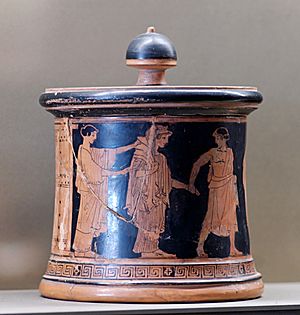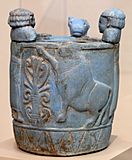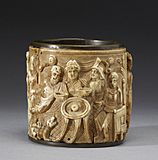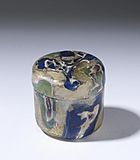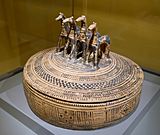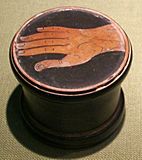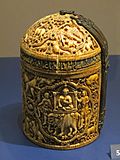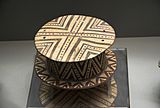Pyxis (vessel) facts for kids
A pyxis (pronounced PIK-sis) is a special kind of container from ancient times. It is usually a round box with a separate lid. People in the past used pyxides (that's the plural of pyxis) to keep small, important things.
Most pyxides that we still find today are made of Greek pottery. But some were also made from wood, metal, or even ivory. The name "pyxis" comes from the ancient city of Corinth. They made their boxes from a type of wood called puksos, which is also known as boxwood.
Contents
What is a Pyxis?
Pyxides were often used by women. They kept things like makeup, small treasures, or jewellery inside them. The design of these boxes changed over time.
Early Pyxis Shapes
The very first pyxides appeared in Athens during the Protogeometric period. At first, there were two main types:
- One type had a pointed bottom. This design did not last very long.
- The other type had a flat bottom. This design continued to be popular for a long time.
As time went on, the flat-bottomed pyxides became larger. Their sides often curved outwards. The lids sometimes had fancy handles.
Later Pyxis Designs
Around the 6th century BC, Athens started making pyxides with curved-in (concave) sides. This shape made them easier to pick up. It also meant they could fit closer together on a shelf.
The pictures on pyxides often showed important events. A common scene was a wedding procession. This showed a young girl moving from her home to her new husband's house.
Pyxides in Churches
The word "pyx" is also used for a special box in Christian churches. This kind of pyx is used to hold and carry consecrated hosts. These are small pieces of bread used in church services. Churches started using these boxes a very long time ago.
Gallery
-
This pyxis is made from "Egyptian faience". It was brought to Italy from northern Syria. It was made between 750-700 BC and is now in the Altes Museum.
-
A round pyxis from the 5th Century, found at The Walters Art Museum.
-
An ivory pyxis from Cordoba, Spain. It was made in the 10th Century AD and is now in the Victoria and Albert Museum.
See also
 In Spanish: Píxide (cerámica) para niños
In Spanish: Píxide (cerámica) para niños


